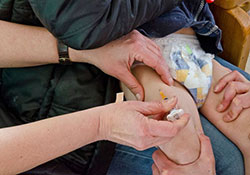Successful national measles and rubella vaccination campaign in Tajikistan

WHO/M. Bring
Nearly 2 million children aged 1–9 years were vaccinated against measles and rubella during a nationwide vaccination campaign in Tajikistan on 15–26 May 2017. The campaign was initiated in response to a measles outbreak which began in 2016 and has caused over 400 confirmed measles cases.
The country’s decision to initiate the mass immunization campaign came in the wake of a call on 28 March 2017 by WHO Regional Director for Europe Dr Zsuzsanna Jakab for policy-makers, health-care workers and parents “to take urgent measures to stop transmission of measles within their borders, and all countries that have already achieved this to keep up their guard and sustain high immunization coverage”.
Successful, coordinated effort
Under the auspices of the Ministry of Health and Social Protection of Population, and with joint support from WHO and United Nations Children’s Fund (UNICEF) country offices, the campaign achieved more than 98% coverage of the target group.
Health centres and outreach initiatives provided vaccination coverage in cities and rural areas, and mobile teams visited remote mountainous areas. In total, the campaign deployed 1472 fixed and outreach vaccination teams and 78 mobile teams. To ensure high coverage among all children, they administered vaccinations regardless of children’s prior vaccination status or personal history of measles or rubella.
Independent intra-campaign monitoring conducted by the Red Crescent Society of Tajikistan identified a high level of preparedness in the country: vaccination points were supplied with bundled measles and rubella vaccines; all health workers involved in the vaccination campaign received training on relevant topics; and organizers conducted communication and social mobilization activities through television and radio broadcasts and the dissemination of information materials.
The Ministry of Health and Social Protection of Population, with overall support from the Government of Tajikistan, coordinated and managed the vaccination campaign. The proper planning and effective teamwork of national professionals and international experts ensured the campaign’s success. It received technical and financial support from the Russian Federation, the Measles and Rubella Initiative, UNICEF and WHO/Europe.
Follow-up to the campaign
To validate officially reported vaccination coverage and identify pockets of unvaccinated people, a countrywide vaccination coverage survey using the lot quality assurance technique was conducted on 31 May–¬3 June, immediately after the campaign. The survey confirmed that the campaign reached the target of 95% both at the national level and in all 20 surveyed districts of the country.
Efforts should now focus on the introduction of case-based surveillance for measles and rubella, and on ensuring sustained high (≥ 95%) routine coverage with 2 doses of the measles and rubella vaccine at both national and district levels.



